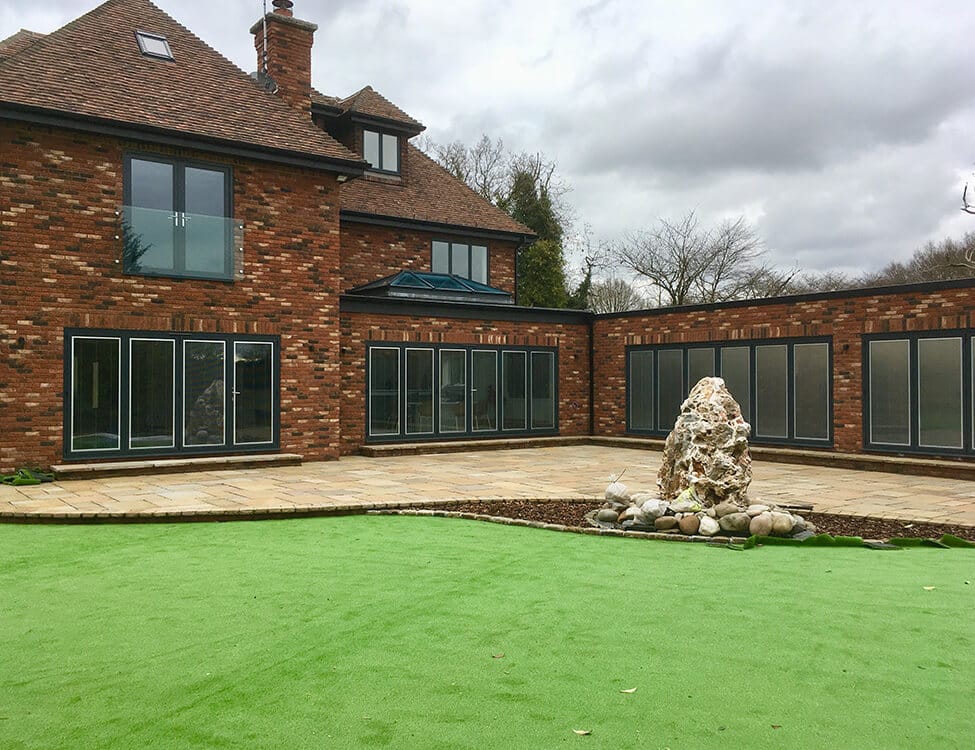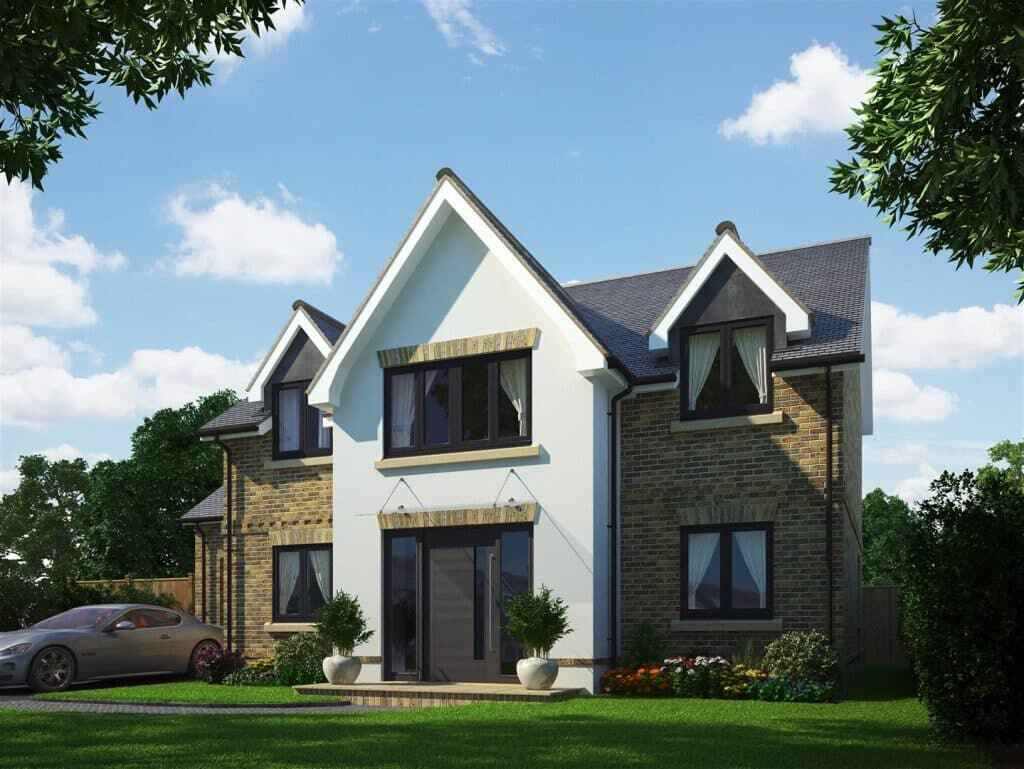A front door is the face of your home. Whether nestled in a sleek contemporary build or gracing a charming Victorian terrace, your choice of door can dramatically affect curb appeal, energy efficiency, and home security.
Among the frontrunners in popularity are composite and UPVC doors, each with its own unique blend of qualities. Yet, for many homeowners, differentiating between the two remains a murky task. This guide breaks down their fundamental differences to help you choose wisely.
Material Composition
Composite Doors
Composite doors are sophisticated, multi-material constructions. At their core lies a robust timber frame, providing rigidity and weight. This is complemented by high-density polyurethane foam for insulation, and then encapsulated in a layer of impact-resistant Glass Reinforced Plastic (GRP). The entire assembly is manufactured under high-pressure conditions, producing a door that is not only structurally solid but also impervious to warping, swelling, or rotting.
UPVC Doors
UPVC (unplasticized polyvinyl chloride) doors, by contrast, consist of a steel frame cloaked in a rigid plastic shell. This structure forms a sealed, weather-resistant barrier that is both strong and energy-efficient. Though less complex in construction than composite doors, UPVC doors are celebrated for their practicality and cost-effectiveness.
Visual Appearance and Design Aesthetics
Composite doors exude the warm, organic charm of authentic timber without the associated upkeep. Thanks to GRP skinning, they can mimic woodgrain textures with remarkable fidelity. They are available in a wide palette of RAL colours, and many come with dual-colour options to match both interior and exterior palettes.
UPVC doors, while stylish, carry a more contemporary plastic sheen. This can make them appear slightly less refined than composite alternatives, especially under close scrutiny. Customisation is still possible, though typically with fewer textures and finishes.
Read More: Do You Need Planning Permission to Change Your Front Door?
Security and Safety Standards
Security is a critical metric in door selection. Composite doors, due to their dense core and GRP exterior, offer superior impact resistance. Most come fitted with multi-point locking systems and reinforced hinges, making them formidable barriers against intrusion.
UPVC doors also perform well in security tests. While slightly lighter in build, they incorporate steel-reinforced frames and advanced locking mechanisms. For most residential situations, both door types provide robust protection, though composite doors edge slightly ahead in terms of deterrence.
Thermal Efficiency and Insulation
The thickness and material composition of composite doors grant them superior thermal performance. The layered construction significantly reduces heat transfer, meaning they retain warmth more effectively and contribute to lower heating bills.
UPVC doors are no slouches either. Their sealed units and insulating properties offer commendable energy efficiency. However, due to their thinner profile, they may allow marginally more heat loss compared to their composite counterparts.
Cost Comparison and Value for Money
Composite doors command a higher price—typically up to 60% more than equivalent UPVC models. This elevated cost reflects their complex manufacturing process, premium materials, and enhanced performance.
In contrast, UPVC doors offer excellent value for budget-conscious homeowners. They deliver strong functionality at a fraction of the cost, making them ideal for back doors, side entrances, or rental properties where aesthetics and longevity are secondary.
Durability and Longevity
A well-maintained composite door can last up to 30 years. Its resistant outer shell and stable core withstand harsh weather, UV exposure, and heavy use with minimal degradation.
UPVC doors, while still durable, have a slightly shorter lifespan—typically between 20 to 25 years. Prolonged exposure to sunlight can cause fading or slight warping over time, though regular care can mitigate these effects.
Read More: What is the Lifespan of Aluminium Doors?
Maintenance and Upkeep
Both door types are virtually maintenance-free. A simple wipe-down with a damp cloth is usually sufficient to keep them looking pristine. Neither requires sanding, painting, or staining. This low-maintenance nature makes them ideal for busy households and low-touch living.
Thickness and Weight
Composite doors are noticeably thicker compared to standard UPVC doors. This heft translates into a more substantial feel when opening or closing, enhancing the sense of quality and security. It also aids in better sound insulation and thermal performance.
UPVC doors are lighter, making them easier to handle, especially for children or elderly residents. However, this does give them a slightly less reassuring feel in comparison.
Suitability for Property Types
Composite doors are a natural fit for period properties or homes seeking to emulate traditional timber doors without the maintenance burden. Their classic aesthetic works well with Georgian, Edwardian, and cottage-style homes.
UPVC doors, with their clean lines and modern finishes, are often better suited to contemporary builds or minimalist exteriors. They offer a more streamlined look that complements modern architecture.
Final Verdict
Both composite and UPVC doors have carved out a respected place in modern home design. Each offers a distinct blend of style, performance, and value. UPVC doors shine as affordable, low-maintenance options with solid performance across the board. Composite doors, meanwhile, are the premium choice—offering better insulation, enhanced security, and a high-end aesthetic that elevates the facade of any home.
Ultimately, the decision comes down to budget, style preference, and the specific role of the door in your property. For secondary entrances or budget-conscious upgrades, UPVC is a sound investment. For statement entrances that marry form with function, composite doors are worth every penny.
If you are willing to go even further, consider an aluminium front door; it improves on both composite and uPVC in every area for a premium price point.
Ready to Transform Your Front Door?
At Chigwell Windows Centre, we supply and install high-quality composite and aluminium doors across London, Essex, and the surrounding areas. Whether you’re looking for timeless elegance or cost-effective practicality, our expert team is here to help you find the perfect door for your home.
Get in touch today for a free, no-obligation quote and discover why homeowners across the region trust Chigwell Windows Centre for unbeatable quality and service.
Call us now or visit our showrooms in Brentwood, Colchester, Epsom, Loughton, or Romford to explore our full range of doors!





